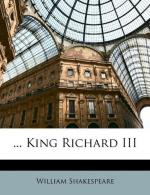|
This section contains 5,037 words (approx. 17 pages at 300 words per page) |

|
SOURCE: Grinnell, Richard W. “Witchcraft and the Theater in Richard III.” Upstart Crow 17 (1997): 66-77.
In the following essay, Grinnell compares the transforming powers of the theater with those of witchcraft and observes that while Richard relies on both to destroy his enemies, Shakespeare employed them as metaphors through which he critiques his society.
When Shakespeare created Richard of Gloucester, he created a master manipulator of character, one born, it seems, for the dangerous realm of the theater as conceived by Puritan critics. At the end of 3 Henry VI Richard tells us that he can “change shapes with Proteus for advantages” (III. ii. 192), and at the beginning of Richard III that his political aspirations rest upon “the plain devil and dissembling looks” (I. ii. 236).1 Richard's equation for success seems clear; it is demonic and theatrical. The shape-shifting god Proteus that Richard so confidently invokes is simultaneously the devil—as...
|
This section contains 5,037 words (approx. 17 pages at 300 words per page) |

|


